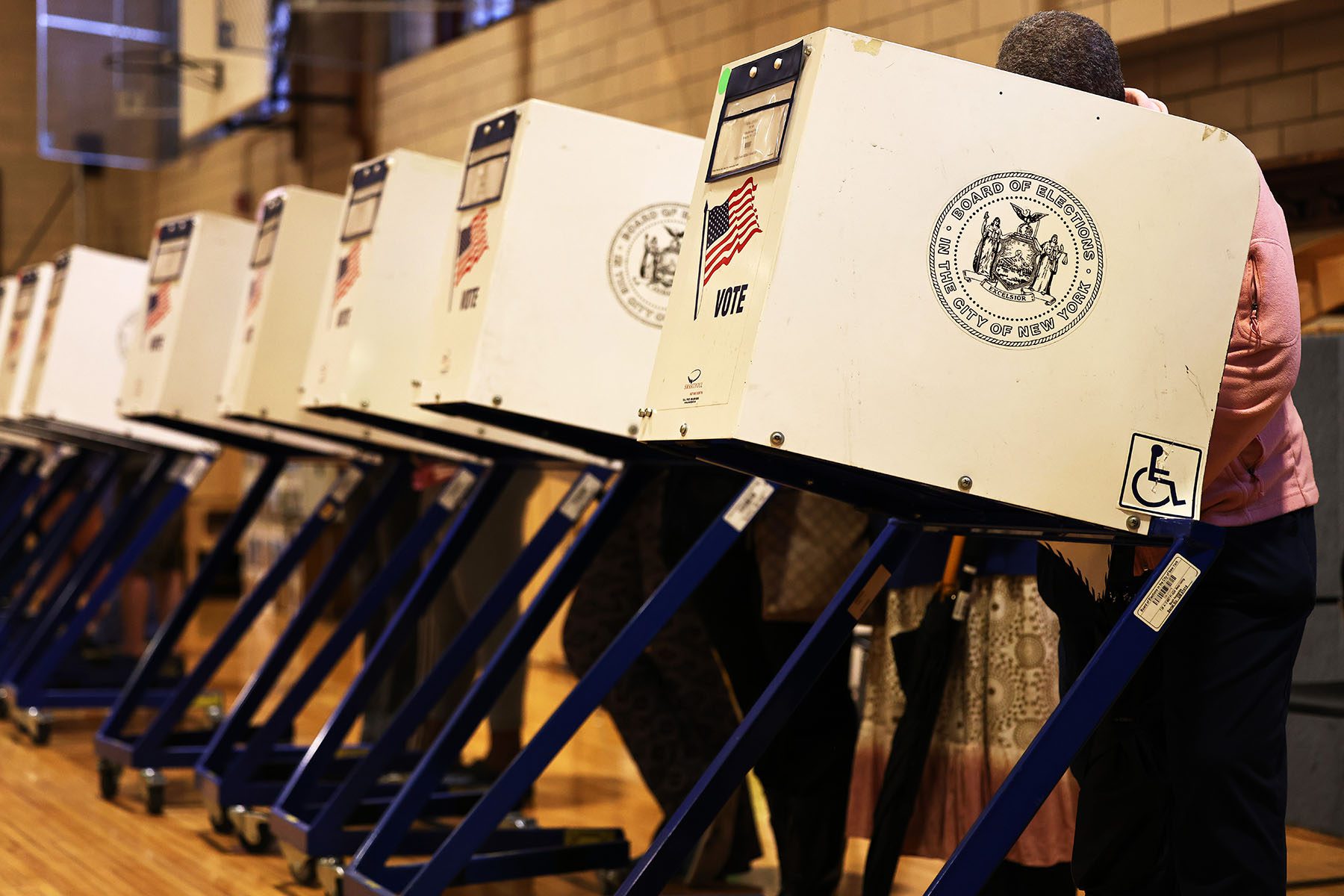Ranked-choice voting, which allows voters to choose multiple candidates and which supporters say encourages more fair and representative elections, is gaining momentum, particularly in Democrat-led states and cities.
Now some Republicans are now trying to ban its use and other forms of instant runoff voting, often preemptively.
South Dakota Gov. Kristi Noem and Idaho Gov. Brad Little both signed bans on ranked-choice voting in March. Republicans have filed similar ban proposals this year in Arizona, Montana, North Dakota and Texas.
The number of proposals to ban the practice is nearly double the legislative activity from last year, when Florida Gov. Ron DeSantis and Tennessee Gov. Bill Lee signed bills into law that prohibited their use, making their states the first to do so.
All four states where bans have been enacted have GOP trifectas, in which Republicans control both chambers of the legislature as well as the governor’s office.
“Entrenched interests are recognizing that they would like to stop ranked-choice voting from moving forward because it has such a profound impact in shifting power dynamics,” said Joshua Graham Lynn, chief executive officer of RepresentUs, a nonpartisan organization that advocates for democracy-related policy. “They, of course, benefit from the power dynamics the way they are.”
Here’s how ranked-choice voting generally works: Voters pick multiple candidates in a race and then, if no one gets a majority of the votes, the candidate with the fewest votes is eliminated. That candidate’s votes are then dispersed to the other candidates based on how voters ranked their subsequent choices. Generally, a candidate is declared a winner when they get the majority of votes after a series of elimination rounds.
Supporters of ranked-choice voting say it helps reduce some of the toxicity of American politics, in part because candidates are incentivized to campaign to be a voter’s second-choice pick. Because candidates work to appeal to their opponents’ supporters, the system may encourage less negative campaigning. It could also reduce the number of candidates with unpopular or extreme policy platforms from running — in part because they may be unable to win a majority of votes.
“That’s why we believe it holds such a promise for American democracy,” said Jeanne Massey, executive director of FairVote Minnesota. “You can no longer win in these high stakes elections with a plurality of 30, 40 percent of the vote and call it a day and govern to that base and ignore the rest of the voters.”
Supporters also believe it encourages more women and people of color to run for office. That’s because ranked-choice voting — also known as RCV — encourages multiple people to run for a seat. Under the current single-winner plurality election system, women candidates or candidates of color may be discouraged from running out of fear that they will split the vote among like-minded voters.
“It increases the likelihood that more diverse folks, in the sense of racial and gender diversity, have ambition to put their hat in the ring,” said Erin Vilardi, CEO of VoteRunLead, a group that helps women run for office. “And all of that gives the voter more power.”
At least 60 jurisdictions have approved ranked-choice voting in recent years. Voters approved statewide ranked-choice voting systems in Maine in 2016 and Alaska in 2020.
Among the key arguments against ranked-choice voting, according to some Republicans, is that it’s confusing or not widely popular. Opposition to it has picked up some support among politicians who have supported conspiracy theories about elections.
“Ranked-choice voting, again, should be called rigged-choice voting,” Arizona Republican Sen. Anthony Kern, who was at the January 6 Capitol riot in 2021, said last month.
Deb Otis, director of research and policy at FairVote, a nonpartisan organization that has studied ranked-choice voting and advocates for its implementation, dismissed such framing.
“Ranked-choice voting challenges the status quo and challenges elected leaders to campaign differently,” she said. “And so, I think support from elected officials tends to be a lagging indicator of support from the voters.”
-
Previous ranked-choice voting coverage
- How ranked-choice voting elevates women and people of color seeking office
- Women are poised to have historic representation on New York City council. Experts credit ranked-choice voting
- Mary Peltola – the first Alaska Native elected to Congress – will keep U.S. House seat
In Nevada, voters last November approved the use of open primaries and ranked-choice voting for federal, statewide and state legislative races. Since voters are attempting to change their state constitution, they must approve the measure again in 2024.
Separately, Seattle recently became one of the largest cities in the nation to OK ranked-choice voting.
Lynn called the bans “misguided.” Many credit Republican Gov. Glenn Youngkin’s win in Virginia on the fact that his party used a ranked-choice voting system in its closed nomination process.
“Republicans up and down the ballot across the country do really well under ranked-choice voting,” said Lynn. “In fact, it’s not a partisan policy.”
Otis believes part of the more recent backlash is tied to last year’s House race in Alaska, where Democrat Mary Peltola defeated Republican Sarah Palin in the first test of ranked-choice voting in the state.
Palin, who called ranked-choice voting “whack” ahead of the general election, has since signed onto an effort to repeal the process in Alaska. One of her supporters, former President Donald Trump, has also been critical of ranked-choice voting.
“At the national level, it appears that it’s becoming more partisan, but I think that’s a false flag,” said Otis, who added that more states are considering ranked-choice voting for presidential primaries. “I think, at the local level and in individual states, we continue to see a lot of bipartisan or cross-partisan support for ranked-choice voting.”
There are signs that not all Republicans oppose ranked-choice voting. While Arizona Gov. Katie Hobbs, a Democrat, vetoed an anti-ranked-choice voting bill that was recently sent to her desk, so did Republican North Dakota Gov. Doug Burgum.
Burgum said the bill, which would have prohibited cities and other political subdivisions from using ranked-choice and similar systems, undermined local control and “home rule” charters that give rulemaking authority to local governments.
“If we truly believe in limited government and local control, we can begin by honoring the boundaries, intent and spirit of home rule charters, especially when there is no evidence of any harm having occurred from trusting the residents of cities to have self-determination within the bounds of their home rule charters,” he said in a statement after the veto in early April.
The Republican legislature later failed to overturn Burgum’s veto.
The attempts to restrict ranked-choice voting comes as a host of other election-related policies are moving through legislatures. Republicans in states including Florida and Texas are considering new criminal penalties for voters accused of voter fraud. In Ohio, lawmakers are advancing a bill that will make it harder for voters to approve ballot measures. And in Montana, Republicans are considering a bill that would change the rules for the upcoming U.S. Senate race involving the only statewide elected Democrat.
Lynn said efforts to stop gerrymandering and address dark money in politics are also connected.
“The reason they push back is because when these policies are substantive, they feel threatened and they feel their power is threatened,” he said. “And they will do whatever they can to protect it. You can be sure that the more transformative a policy is, the more pushback there’s going to be.”
Massey has been a presence at the Minnesota Capitol this year, trying to get a comprehensive ranked-choice voting bill passed. She’s helped for years to expand the use of ranked-choice voting in cities across Minnesota, so she went into this year’s legislative session with high hopes that lawmakers might finalize its use for all state and federal elections in the state.
The Democratic-controlled state Senate approved a bill this month that would allow more local communities to adopt its use and establish a task force to consider statewide adoption. Massey said the amended bill may not ultimately result in everything they hoped for, but she still sees the legislature’s actions as a win.
Eventually, Massey believes, lawmakers in the new Democratic trifecta will pass statewide ranked-choice voting.
“It still moves ranked-choice voting forward,” she said.
Correction: An earlier version of this article incorrectly stated Deb Otis's title at FairVote. It also incorrectly said Seattle was the second largest city to OK ranked-choice voting.








